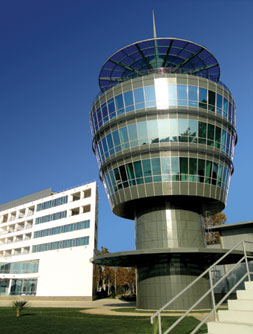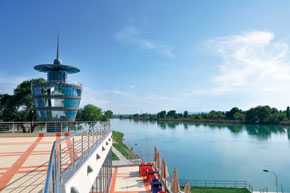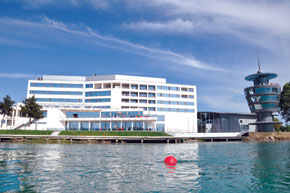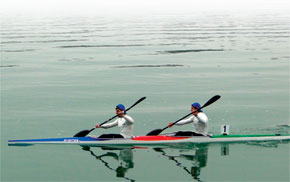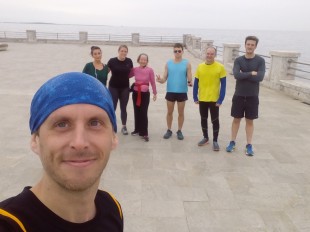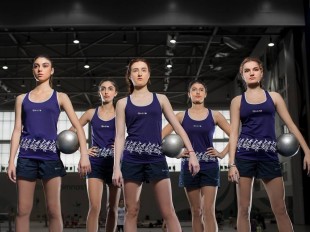Pages 94-97
by Shirin Manafov
An international regatta was held in Mingechevir after 6-years of reconstruction at the well-known rowing centre. Competitors from Ukraine, Russia, Iran and Georgia were convinced that a world class rowing centre had been created on the Kur river.
The regatta for the President’s Cup recalled the times when the rowing base was in its prime, from 1980-1987. More than one hundred rowers from Georgia, Russia and Azerbaijan took part in the competition. The interest in rowing in Azerbaijan and the quality of training for our oarsmen creates belief in a brilliant future for the Kur rowing centre – this was noted by the guests of honour at the competition: President of the International Canoe Federation (ICF) Jose Perurena and President of the European Canoe Association, Albert Woods.
The Kur sports centre, a well-known hatchery of USSR champions, has not just changed, it is now a completely new, modern sporting village, consisting of ten buildings.
There is a unique building next to the Kur hotel, a referees’ viewing tower from the top of which an amazing view opens onto the largest and deepest river in the Caucasus. The revival of the rowing centre has inspired the city authorities: two hotels have been built on the opposite bank and a third is under construction. Mingechevir lives in anticipation of a tourist boom.
A lucky base
The Kur is a legendarily lucky base for rowers; the elite among them flocked here, but it was neglected from the disintegration of the USSR until reconstruction began in 2005.
The renewal has rescued the banks of the Kur river and the rowing base has a major town-planning function for Mingechevir. It was necessary to comply with world standards during redevelopment of the centre and this has been fulfilled in constructing a tourist complex on the river banks. The so-called General’s Summer Residence, which is nearby and belonged to the Transcaucasian military district in Soviet times, has been rebuilt. Also under construction is a sports centre for the Caspian flotilla, in place of the small houses once reserved for recreational use by Soviet army generals. This is only the beginning of a transformation of the banks of the Kur river into a sanatorium and sports zone for Ganja city and the whole central region of the country. The spa and tourist potential of the Kur zone from Mingechevir to the Varvarinsky hydropower plant exceeds that of Nabran. Approximately 50 thousand people will spend their holidays here over the summer period. If the banks of the water basin, where there are already three hotels, are included in this zone then the number of holidaymakers will reach 60 thousand.
A base for the sporting elite
The Kur rowing centre is one of the finest in the world of water sports. It guarantees prize-winning places in world ranking championships. The combined team of the USSR used to train here all year round. Tri ple Olympic champion V.Ivanov, tri ple world champions, the Pimenov brothers and dozens of others were indebted to the Kur centre for their success. By number of awards and prizes, the Kur compared with the Medeo high altitude skating rink near Almaty for skaters. The revival of the Kur base is seen as a key development in the international Olympic movement.
On 14 October 2010, President Ilham Aliev opened the rowing centre, for the restoration of which the International Olympic Committee had allocated eleven million Euros, with two million Euros coming from the national budget. Representatives of the IOC and sports federations participated in the opening ceremony. Water sports professionals had waited for six long years for that day. The many Olympic and World champions who had developed here had had to switch to rowing bases in Bulgaria or Portugal. As noted at the opening, the Kur base had produced rowing champions since 1970, both for the USSR and for Eastern European countries. The task given to the revived sports base is to bring world sport back to the Kur and to become the training centre of choice, not only for the national team of Azerbaijan, but also for combined teams – the leaders of world rowing. The Kur base gives every indication of achieving this.
Nicolai Rusak, boat racing coach of the Russian national team, believes that the Kur base is the best in the world for training facilities and as a residence for coaches and competitors. The whole settlement is set in a pine wood on the bank of the river. It has no equal either in the CIS or in Europe. The combined teams of the Russian Federation currently have their winter training sessions in Portugal and their summer ones in Belarus. There is no need to pay 2500 Euros per participant for a training session in Portugal if it is half the price in Azerbaijan. The Kur river centre is the ideal place for training and competition and long stays in an unfamiliar climate zone can upset the biorhythms. In the course of time, it will become the nucleus of a sports settlement where other athletes, as well as rowers, will hold their training sessions.
Jochen Zulke and Rudiger Hauffe, coaches of Azerbaijan’s national team, agree with Rusak. Besides these German experts, our national team is trained by coaches from Ukraine and Bulgaria. At present German training methods and German boats are recognized as the best in rowing. Nicolai Rusak is sure that our rowers will contend for world leadershi p at the London Olympics in 2012.
Only the rowing centre in Poznan (Poland) could be compared with the Kur base in conditions for training, but the hotels in Poznan are far from the base. This is a big disadvantage, as it is necessary to train three times a day, for 6-8 hours. The rowing base in Portugal is also good, but the Kur base has the advantage. This is not to mention the huge cost of air tickets.
As triple Olympic champion V.Ivanov, who trained in Mingechevir for many years, noted: the Kur river is the best trainer. The river is ice-free all year round and provides the optimal speed training process within the rowing centre. Water resistance develops velocity endurance and produces the stock for a finishing spurt. As rowers say, after the Kur river you glide like a bird on all other rowing channels.
Top drawer facilities
Bojko Gubernich, the centre’s sports manager, takes pride in showing off the facilities. We begin our tour in the boathouse, storing boats which cost from 4 thousand Euros up to astronomical sums; for an eight, the cost of the best German boats compare with those of a Lexus car. Nearby there is a 50 metre swimming pool, past that there is an excellent hall for basketball, volleyball and indoor football. In the same building there are training halls with 17 simulators to develop all the muscles. This is very important, as only boat racing teams trained here in the Soviet era. Now there are facilities for kayak and canoe rowers, as well as for players of game sports.
World cup holder and five-time national champion power lifter Samir Mammadov is in charge of the training hall. Like all personnel at the rowing centre, Samir had to compete for his position. He was chosen from 74 candidates. In all, three thousand applications were submitted for 205 jobs.
Magnificent conditions for rehabilitation, such as Turkish and Finnish saunas, as well as massage rooms and recreational rooms, are at the athletes’ disposal, as is a football stadium across the road from the rowing base. Within a hundred metres there is a school and a modern technical college which, in time, could become an educational base for them. In fact many sportsmen will train here for years and, in the event of large numbers of students attending, an educational centre may be created near the rowing centre.
Bojko Gubernich himself comes from a small town called Krushevac, next to Lake Cheliska. Krushevac was formerly the capital of Serbia. Gubernich talks about how the sports base on Lake Cheliska turned small town Krushevac into a capital of European sport. Teams not only from Serbia, but also from Germany and Austria, have training sessions there, supplying the city treasury with income. The Kur base has every possibility of presenting the same magnificent gift to Mingechevir. In Soviet times profit from the rowing centre was a great help to the city treasury. The range of training halls facilitated training sessions for rowing as well as other sports. This explains the interest of neighbouring sports federations – in Georgia, Iran and Russia.
Regional development
The development strategy for the region sees the banks of the Kur river as a diversified sports and tourist complex. The IOC has underwritten this development. The Kur base is so well-known to champions from different countries that in 2004 the IOC allocated 11 million Euros for its revival. This princely gesture by the IOC is a guarantee for large investors. The rowing centre as the guarantor of future tourism in the region is already justified by the investment attracted into Mingechevir’s hotel business. It will lead to investment in the development of sports and tourist complexes for the line of cities across the centre of the country. It is about an hour’s drive to Ganja in good conditions and roads are necessary for the transformation of Ganja into a new Nabran, a recreation zone on the Kur river. There is also the possibility of training on the high-mountain Lake Maralgol. Training on both the Kur and the lake will make the base the leader in its field. With a modern highway to Ganja, the Kur centre will have no equal in its level of service, comfort and variety of training methods.
The centre currently provides work for 205 people, approximately as many people work in the hotels on the opposite bank and more workplaces will open in the future. Reasonable prices and the high level of service are also attractive. The cost of an athlete’s stay is approximately the same in Portugal and Mingechevir, but the levels of efficiency are not. There are not only the best conditions for training, but you feel that the Kur centre is your world, your home, where everything is done to make a long stay comfortable. A training facility for the world federation of rowing has been created and there will be several such centres of international sports and tourism in Azerbaijan.
President of the International Canoe Federation Jose Perurena stated with some confidence that the elite of World rowing will assemble at the Kur rowing centre, just as they did in former times. First-class sportsmen are formed at such gatherings; it is an excellent school for coaches and for managers of sports and tourist complexes. These are relatively new professions and are in demand. It is difficult to improve the efficiency of Olympic centres in the country’s regions without such experts. The centre’s potential is continually expanding. A leisure centre for sportsmen will open soon. A museum should also be established here, given the number of Olympic champions who trained at the Kur centre. Leisure facilities are already underway: hotels have been built and new ones are under construction on the opposite bank, a parkway within the city boundaries on both sides of the Kur river has been created.
Bojko Gubernich says:
“We are going to develop tourism: sports, ecology, hunting, fishing and trips to Ganja, Sheki and other cities. Workshops and conferences can be held in the ‘Kur’ hotel. The average cost of staying at the ‘Kur’ is 55 AZN on average for sportsmen, for tourists it is a little bit more. We have already established partner relationships with hotels and tourist agencies in Ganja, Qabala, Sheki and other cities.” So the Mingechevir Rowing Centre is now considered one of the best in the world for water sports, and it has a brilliant future.
by Shirin Manafov
An international regatta was held in Mingechevir after 6-years of reconstruction at the well-known rowing centre. Competitors from Ukraine, Russia, Iran and Georgia were convinced that a world class rowing centre had been created on the Kur river.
The regatta for the President’s Cup recalled the times when the rowing base was in its prime, from 1980-1987. More than one hundred rowers from Georgia, Russia and Azerbaijan took part in the competition. The interest in rowing in Azerbaijan and the quality of training for our oarsmen creates belief in a brilliant future for the Kur rowing centre – this was noted by the guests of honour at the competition: President of the International Canoe Federation (ICF) Jose Perurena and President of the European Canoe Association, Albert Woods.
The Kur sports centre, a well-known hatchery of USSR champions, has not just changed, it is now a completely new, modern sporting village, consisting of ten buildings.
There is a unique building next to the Kur hotel, a referees’ viewing tower from the top of which an amazing view opens onto the largest and deepest river in the Caucasus. The revival of the rowing centre has inspired the city authorities: two hotels have been built on the opposite bank and a third is under construction. Mingechevir lives in anticipation of a tourist boom.
A lucky base
The Kur is a legendarily lucky base for rowers; the elite among them flocked here, but it was neglected from the disintegration of the USSR until reconstruction began in 2005.
The renewal has rescued the banks of the Kur river and the rowing base has a major town-planning function for Mingechevir. It was necessary to comply with world standards during redevelopment of the centre and this has been fulfilled in constructing a tourist complex on the river banks. The so-called General’s Summer Residence, which is nearby and belonged to the Transcaucasian military district in Soviet times, has been rebuilt. Also under construction is a sports centre for the Caspian flotilla, in place of the small houses once reserved for recreational use by Soviet army generals. This is only the beginning of a transformation of the banks of the Kur river into a sanatorium and sports zone for Ganja city and the whole central region of the country. The spa and tourist potential of the Kur zone from Mingechevir to the Varvarinsky hydropower plant exceeds that of Nabran. Approximately 50 thousand people will spend their holidays here over the summer period. If the banks of the water basin, where there are already three hotels, are included in this zone then the number of holidaymakers will reach 60 thousand.
A base for the sporting elite
The Kur rowing centre is one of the finest in the world of water sports. It guarantees prize-winning places in world ranking championships. The combined team of the USSR used to train here all year round. Tri ple Olympic champion V.Ivanov, tri ple world champions, the Pimenov brothers and dozens of others were indebted to the Kur centre for their success. By number of awards and prizes, the Kur compared with the Medeo high altitude skating rink near Almaty for skaters. The revival of the Kur base is seen as a key development in the international Olympic movement.
On 14 October 2010, President Ilham Aliev opened the rowing centre, for the restoration of which the International Olympic Committee had allocated eleven million Euros, with two million Euros coming from the national budget. Representatives of the IOC and sports federations participated in the opening ceremony. Water sports professionals had waited for six long years for that day. The many Olympic and World champions who had developed here had had to switch to rowing bases in Bulgaria or Portugal. As noted at the opening, the Kur base had produced rowing champions since 1970, both for the USSR and for Eastern European countries. The task given to the revived sports base is to bring world sport back to the Kur and to become the training centre of choice, not only for the national team of Azerbaijan, but also for combined teams – the leaders of world rowing. The Kur base gives every indication of achieving this.
Nicolai Rusak, boat racing coach of the Russian national team, believes that the Kur base is the best in the world for training facilities and as a residence for coaches and competitors. The whole settlement is set in a pine wood on the bank of the river. It has no equal either in the CIS or in Europe. The combined teams of the Russian Federation currently have their winter training sessions in Portugal and their summer ones in Belarus. There is no need to pay 2500 Euros per participant for a training session in Portugal if it is half the price in Azerbaijan. The Kur river centre is the ideal place for training and competition and long stays in an unfamiliar climate zone can upset the biorhythms. In the course of time, it will become the nucleus of a sports settlement where other athletes, as well as rowers, will hold their training sessions.
Jochen Zulke and Rudiger Hauffe, coaches of Azerbaijan’s national team, agree with Rusak. Besides these German experts, our national team is trained by coaches from Ukraine and Bulgaria. At present German training methods and German boats are recognized as the best in rowing. Nicolai Rusak is sure that our rowers will contend for world leadershi p at the London Olympics in 2012.
Only the rowing centre in Poznan (Poland) could be compared with the Kur base in conditions for training, but the hotels in Poznan are far from the base. This is a big disadvantage, as it is necessary to train three times a day, for 6-8 hours. The rowing base in Portugal is also good, but the Kur base has the advantage. This is not to mention the huge cost of air tickets.
As triple Olympic champion V.Ivanov, who trained in Mingechevir for many years, noted: the Kur river is the best trainer. The river is ice-free all year round and provides the optimal speed training process within the rowing centre. Water resistance develops velocity endurance and produces the stock for a finishing spurt. As rowers say, after the Kur river you glide like a bird on all other rowing channels.
Top drawer facilities
Bojko Gubernich, the centre’s sports manager, takes pride in showing off the facilities. We begin our tour in the boathouse, storing boats which cost from 4 thousand Euros up to astronomical sums; for an eight, the cost of the best German boats compare with those of a Lexus car. Nearby there is a 50 metre swimming pool, past that there is an excellent hall for basketball, volleyball and indoor football. In the same building there are training halls with 17 simulators to develop all the muscles. This is very important, as only boat racing teams trained here in the Soviet era. Now there are facilities for kayak and canoe rowers, as well as for players of game sports.
World cup holder and five-time national champion power lifter Samir Mammadov is in charge of the training hall. Like all personnel at the rowing centre, Samir had to compete for his position. He was chosen from 74 candidates. In all, three thousand applications were submitted for 205 jobs.
Magnificent conditions for rehabilitation, such as Turkish and Finnish saunas, as well as massage rooms and recreational rooms, are at the athletes’ disposal, as is a football stadium across the road from the rowing base. Within a hundred metres there is a school and a modern technical college which, in time, could become an educational base for them. In fact many sportsmen will train here for years and, in the event of large numbers of students attending, an educational centre may be created near the rowing centre.
Bojko Gubernich himself comes from a small town called Krushevac, next to Lake Cheliska. Krushevac was formerly the capital of Serbia. Gubernich talks about how the sports base on Lake Cheliska turned small town Krushevac into a capital of European sport. Teams not only from Serbia, but also from Germany and Austria, have training sessions there, supplying the city treasury with income. The Kur base has every possibility of presenting the same magnificent gift to Mingechevir. In Soviet times profit from the rowing centre was a great help to the city treasury. The range of training halls facilitated training sessions for rowing as well as other sports. This explains the interest of neighbouring sports federations – in Georgia, Iran and Russia.
Regional development
The development strategy for the region sees the banks of the Kur river as a diversified sports and tourist complex. The IOC has underwritten this development. The Kur base is so well-known to champions from different countries that in 2004 the IOC allocated 11 million Euros for its revival. This princely gesture by the IOC is a guarantee for large investors. The rowing centre as the guarantor of future tourism in the region is already justified by the investment attracted into Mingechevir’s hotel business. It will lead to investment in the development of sports and tourist complexes for the line of cities across the centre of the country. It is about an hour’s drive to Ganja in good conditions and roads are necessary for the transformation of Ganja into a new Nabran, a recreation zone on the Kur river. There is also the possibility of training on the high-mountain Lake Maralgol. Training on both the Kur and the lake will make the base the leader in its field. With a modern highway to Ganja, the Kur centre will have no equal in its level of service, comfort and variety of training methods.
The centre currently provides work for 205 people, approximately as many people work in the hotels on the opposite bank and more workplaces will open in the future. Reasonable prices and the high level of service are also attractive. The cost of an athlete’s stay is approximately the same in Portugal and Mingechevir, but the levels of efficiency are not. There are not only the best conditions for training, but you feel that the Kur centre is your world, your home, where everything is done to make a long stay comfortable. A training facility for the world federation of rowing has been created and there will be several such centres of international sports and tourism in Azerbaijan.
President of the International Canoe Federation Jose Perurena stated with some confidence that the elite of World rowing will assemble at the Kur rowing centre, just as they did in former times. First-class sportsmen are formed at such gatherings; it is an excellent school for coaches and for managers of sports and tourist complexes. These are relatively new professions and are in demand. It is difficult to improve the efficiency of Olympic centres in the country’s regions without such experts. The centre’s potential is continually expanding. A leisure centre for sportsmen will open soon. A museum should also be established here, given the number of Olympic champions who trained at the Kur centre. Leisure facilities are already underway: hotels have been built and new ones are under construction on the opposite bank, a parkway within the city boundaries on both sides of the Kur river has been created.
Bojko Gubernich says:
“We are going to develop tourism: sports, ecology, hunting, fishing and trips to Ganja, Sheki and other cities. Workshops and conferences can be held in the ‘Kur’ hotel. The average cost of staying at the ‘Kur’ is 55 AZN on average for sportsmen, for tourists it is a little bit more. We have already established partner relationships with hotels and tourist agencies in Ganja, Qabala, Sheki and other cities.” So the Mingechevir Rowing Centre is now considered one of the best in the world for water sports, and it has a brilliant future.
